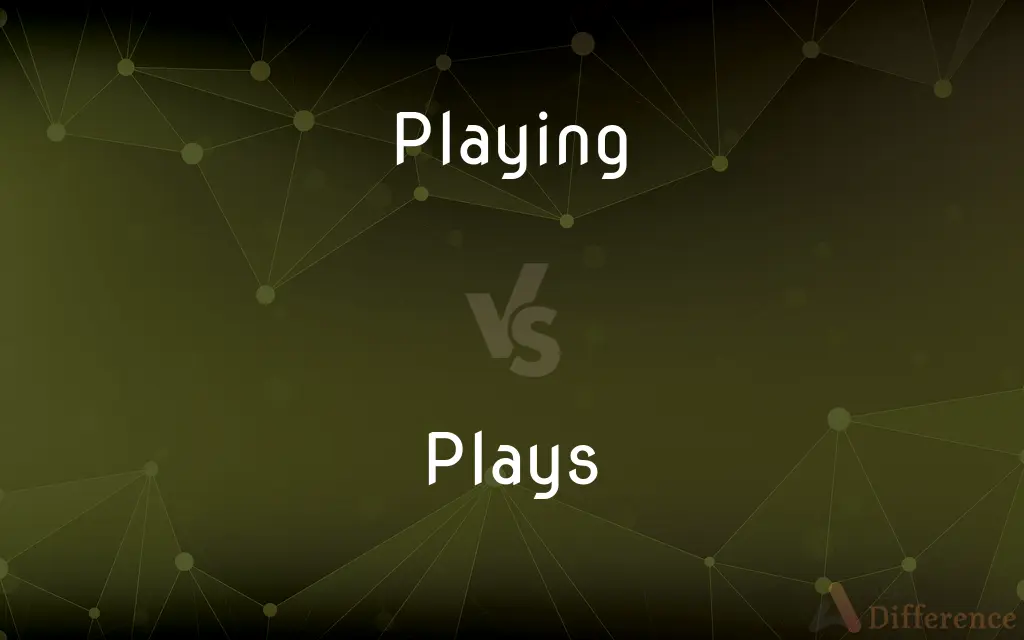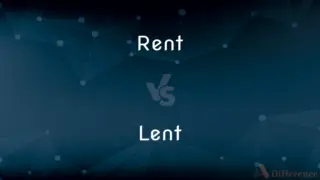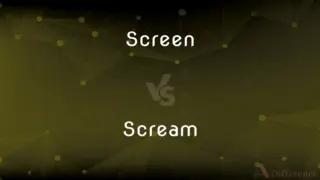Playing vs. Plays — What's the Difference?
Edited by Tayyaba Rehman — By Maham Liaqat — Updated on April 4, 2024
"Playing" refers to the act of engaging in a game or activity, emphasizing an ongoing action, whereas "plays" can denote either present-tense actions or scripted performances, highlighting form and context.

Difference Between Playing and Plays
Table of Contents
ADVERTISEMENT
Key Differences
"Playing" is the gerund or present participle form of the verb "play," indicating the action of participating in a game or activity is currently happening. This form suggests a continuous, active engagement, often used to describe actions that are unfolding at the moment. For example, when someone says, "I am playing chess," it implies they are in the midst of the game. On the other hand, "plays" can serve as both the third person singular present tense of "play," such as in "He plays chess," indicating a habitual action, or refer to theatrical performances, as in "Shakespeare's plays."
The usage of "playing" is versatile, extending beyond games to include the act of playing musical instruments or roles in acting. It captures the essence of involvement and participation, whether it's someone playing the piano or playing a character in a drama. Whereas "plays," when referring to theater, embodies a collection of work or a singular performance, signifying a structured form of art. The difference in application underlines the dynamic action of "playing" against the static, established nature of "plays" as works of drama.
In grammar, "playing" is often used with auxiliary verbs to form the continuous tense, indicating ongoing activities. This construction is essential for conveying actions that are currently in progress, adding a temporal layer to the narrative. In contrast, "plays" in its verb form illustrates routine or repeated actions, particularly when discussing habits or regular activities, thereby offering a glimpse into frequency or pattern rather than continuity.
When discussing children or animals, "playing" frequently captures the connotation of leisure and enjoyment, illustrating a spontaneous and joyful engagement with their surroundings or with each other. This contrasts with "plays" in the context of theater, where it represents a deliberate, crafted form of storytelling, showcasing the creative expression through performance and dialogue.
Both "playing" and "plays," despite their differences, highlight the broad spectrum of "play" as a verb and noun, encompassing physical activities, artistic expressions, and performances. They reflect the multifaceted nature of play, whether it's the act of doing, the habit of engaging, or the art of performing, underscoring the rich, diverse implications of the term depending on its form and context.
ADVERTISEMENT
Comparison Chart
Form
Gerund/Present Participle
Third Person Singular Present or Noun (Theatrical)
Usage
Describes ongoing action or activity
Describes habitual action or theatrical performances
Context
Games, musical instruments, acting roles
Habitual activities, scripted drama
Connotation
Active engagement, continuous
Habitual action, static representation
Examples
"Playing chess," "Playing the guitar"
"He plays chess," "Shakespeare's plays"
Compare with Definitions
Playing
Performing music on an instrument.
He enjoys playing the piano daily.
Plays
Scripted theatrical works.
Shakespeare's plays are still performed worldwide.
Playing
Engaging in a game or activity.
She is playing soccer in the park.
Plays
Third person singular present of "play".
She plays tennis every weekend.
Playing
Participating in a playful action.
The dog is playing with its toy.
Plays
Refers to the action of manipulating situations.
She plays her cards well in negotiations.
Playing
Acting in a role.
They are playing the leads in the school play.
Plays
Involves operating a device or instrument.
He plays the recordings during presentations.
Playing
Involvement in an electronic game.
I was playing a video game all evening.
Plays
Describes the action of performing in theater.
He plays the role of Hamlet.
Playing
To occupy oneself in an activity for amusement or recreation
Children playing with toys.
Plays
To occupy oneself in an activity for amusement or recreation
Children playing with toys.
Playing
To take part in a sport or game
He's just a beginner and doesn't play well.
Plays
To take part in a sport or game
He's just a beginner and doesn't play well.
Playing
To participate in betting; gamble.
Plays
To participate in betting; gamble.
Playing
To behave in a teasing or joking manner; act in jest or sport
She's not angry with you.
She's just playing.
Plays
To behave in a teasing or joking manner; act in jest or sport
She's not angry with you.
She's just playing.
Playing
To deal or behave carelessly or indifferently, especially for one's own amusement; toy
She isn't interested in you.
She's just playing with you.
Plays
To deal or behave carelessly or indifferently, especially for one's own amusement; toy
She isn't interested in you.
She's just playing with you.
Playing
To act or conduct oneself in a specified way
Play fair.
An investor who plays cautiously.
Plays
To act or conduct oneself in a specified way
Play fair.
An investor who plays cautiously.
Playing
To act, especially in a dramatic production.
Plays
To act, especially in a dramatic production.
Playing
To perform on an instrument
Play on an accordion.
Plays
To perform on an instrument
Play on an accordion.
Playing
To emit sound or be sounded in performance
The band is playing.
Plays
To emit sound or be sounded in performance
The band is playing.
Playing
To be performed, as in a theater or on television
A good movie is playing tonight.
Plays
To be performed, as in a theater or on television
A good movie is playing tonight.
Playing
To be received or accepted
A speech that played poorly with the voters.
Plays
To be received or accepted
A speech that played poorly with the voters.
Playing
To move or seem to move quickly, lightly, or irregularly
The breeze played on the water.
Plays
To move or seem to move quickly, lightly, or irregularly
The breeze played on the water.
Playing
To function or discharge uninterruptedly
The fountains played in the courtyard.
Plays
To function or discharge uninterruptedly
The fountains played in the courtyard.
Playing
To move or operate freely within a bounded space, as machine parts do.
Plays
To move or operate freely within a bounded space, as machine parts do.
Playing
To engage in (a game or sport)
Play hockey.
Play chess.
Plays
To engage in (a game or sport)
Play hockey.
Play chess.
Playing
To compete against in a game or sport
We play the Tigers today.
Plays
To compete against in a game or sport
We play the Tigers today.
Playing
To compete in a game or sport at (a location)
The New York Yankees played Fenway Park last night.
Plays
To compete in a game or sport at (a location)
The New York Yankees played Fenway Park last night.
Playing
To occupy or work at (a position) in a game
Lou Gehrig played first base.
Plays
To occupy or work at (a position) in a game
Lou Gehrig played first base.
Playing
To put (a player) at a position in a sport or in a game
Let's play her at first base.
Plays
To put (a player) at a position in a sport or in a game
Let's play her at first base.
Playing
To use or move (a card or piece) in a game
Play the ace of clubs.
Plays
To use or move (a card or piece) in a game
Play the ace of clubs.
Playing
To hit (a ball, shot, or stroke), as in tennis
Played a strong backhand.
Plays
To hit (a ball, shot, or stroke), as in tennis
Played a strong backhand.
Playing
To attempt to keep or gain possession or control of
No foul was called because he was playing the ball.
Plays
To attempt to keep or gain possession or control of
No foul was called because he was playing the ball.
Playing
To perform or act (a role or part) in a dramatic performance.
Plays
To perform or act (a role or part) in a dramatic performance.
Playing
To assume the role of; act as
Played the peacemaker at the meeting.
Plays
To assume the role of; act as
Played the peacemaker at the meeting.
Playing
To pretend to be; mimic the activities of
Played cowboy.
Played the star.
Plays
To pretend to be; mimic the activities of
Played cowboy.
Played the star.
Playing
To perform (a theatrical work or part of a work)
The actors played the scene with great skill.
Plays
To perform (a theatrical work or part of a work)
The actors played the scene with great skill.
Playing
To present a theatrical performance or other entertainment in (a given place)
The company played Boston last week.
Plays
To present a theatrical performance or other entertainment in (a given place)
The company played Boston last week.
Playing
To bet; wager
Played ten dollars on the horse.
Plays
To bet; wager
Played ten dollars on the horse.
Playing
To make bets on
Play the races.
Plays
To make bets on
Play the races.
Playing
To perform or put into effect, especially as a jest or deception
Play a joke on a friend.
Plays
To perform or put into effect, especially as a jest or deception
Play a joke on a friend.
Playing
To handle; manage
Played the matter quietly.
Plays
To handle; manage
Played the matter quietly.
Playing
To use or manipulate, especially for one's own interests
Played his opponents against each other.
Plays
To use or manipulate, especially for one's own interests
Played his opponents against each other.
Playing
To perform on (an instrument)
Play the guitar.
Plays
To perform on (an instrument)
Play the guitar.
Playing
To perform (a piece) on instruments or an instrument.
Plays
To perform (a piece) on instruments or an instrument.
Playing
To cause (a movie, audiotape, or other recording) to be presented in audible or visible form.
Plays
To cause (a movie, audiotape, or other recording) to be presented in audible or visible form.
Playing
To discharge or direct in a certain direction
Played the water on the burning roof.
Plays
To discharge or direct in a certain direction
Played the water on the burning roof.
Playing
To cause to move rapidly, lightly, or irregularly
Play lights over the dance floor.
Plays
To cause to move rapidly, lightly, or irregularly
Play lights over the dance floor.
Playing
To exhaust (a hooked fish) by allowing it to pull on the line.
Plays
To exhaust (a hooked fish) by allowing it to pull on the line.
Playing
A literary work written for performance on the stage; a drama.
Plays
A literary work written for performance on the stage; a drama.
Playing
The performance of such a work.
Plays
The performance of such a work.
Playing
Activity engaged in for enjoyment or recreation.
Plays
Activity engaged in for enjoyment or recreation.
Playing
Fun or jesting
It was all done in play.
Plays
Fun or jesting
It was all done in play.
Playing
The act or manner of engaging in a game or sport
After a time-out, play resumed. The golf tournament featured expert play.
Plays
The act or manner of engaging in a game or sport
After a time-out, play resumed. The golf tournament featured expert play.
Playing
The act or manner of using a card, piece, or ball in a game or sport
My partner's play of the last trump.
His clumsy play of the rebound.
Plays
The act or manner of using a card, piece, or ball in a game or sport
My partner's play of the last trump.
His clumsy play of the rebound.
Playing
A move or an action in a game
It's your play. The runner was thrown out in a close play.
Plays
A move or an action in a game
It's your play. The runner was thrown out in a close play.
Playing
Participation in betting; gambling.
Plays
Participation in betting; gambling.
Playing
Manner of dealing with others; conduct
Fair play.
Plays
Manner of dealing with others; conduct
Fair play.
Playing
An attempt to obtain something; a bid
A play for sympathy.
Plays
An attempt to obtain something; a bid
A play for sympathy.
Playing
Action, motion, or use
The play of the imagination.
Plays
Action, motion, or use
The play of the imagination.
Playing
Freedom or occasion for action; scope
Give full play to an artist's talents.
Plays
Freedom or occasion for action; scope
Give full play to an artist's talents.
Playing
Movement or space for movement, as of mechanical parts.
Plays
Movement or space for movement, as of mechanical parts.
Playing
Quick, often irregular movement or action, especially of light or color
The play of color on iridescent feathers.
Plays
Quick, often irregular movement or action, especially of light or color
The play of color on iridescent feathers.
Playing
A control mechanism on an audio or video player that starts or resumes the audible or visual presentation of a recording.
Plays
A control mechanism on an audio or video player that starts or resumes the audible or visual presentation of a recording.
Playing
A geological deposit, as of oil or natural gas, considered as a prospect for commercial extraction.
Plays
A geological deposit, as of oil or natural gas, considered as a prospect for commercial extraction.
Playing
(gerund of play) An occasion on which something, such as a song or show, is played.
Plays
Plural of play
Playing
Present participle of play
Playing
The act of playing a musical instrument
Playing
The action of taking part in a game or sport or other recreation
Playing
The performance of a part or role in a drama
Common Curiosities
How is "plays" used differently from "playing"?
"Plays" can denote habitual actions or refer to theatrical performances, highlighting either routine activities or scripted dramas.
How does the use of "plays" differ in grammar?
"Plays" is used as the third person singular present tense of "play" for habitual actions or as a noun for theatrical works, indicating regularity or artistic productions.
What does "playing" imply in a sentence?
"Playing" implies an ongoing, active engagement in an activity, game, or performance at that moment.
Can "playing" refer to activities beyond games?
Yes, "playing" can also refer to playing musical instruments, participating in plays, or engaging in any leisure activities.
Is "playing" only used for physical activities?
No, "playing" extends to activities like playing musical instruments, video games, or roles in acting, encompassing both physical and non-physical actions.
What does "playing" convey in terms of mood?
"Playing" often conveys a sense of joy, spontaneity, and engagement, associated with leisure and enjoyment.
Why are "plays" important in literature?
"Plays" are vital for their role in storytelling, cultural expression, and as a medium for exploring complex themes and human emotions through performance.
How do "playing" and "plays" relate to each other?
While "playing" can be part of "plays" in terms of actors engaging in their roles, their primary distinctions lie in "playing" denoting action and "plays" referring to habitual actions or the art form of theater.
What are "plays" in the context of theater?
In theater, "plays" refer to scripted performances or the body of work created for theatrical presentations.
Can "playing" and "plays" be used interchangeably?
No, they serve different grammatical and contextual purposes, with "playing" indicating ongoing actions and "plays" denoting habitual actions or theatrical works.
Share Your Discovery

Previous Comparison
Rent vs. Lent
Next Comparison
Screen vs. ScreamAuthor Spotlight
Written by
Maham LiaqatEdited by
Tayyaba RehmanTayyaba Rehman is a distinguished writer, currently serving as a primary contributor to askdifference.com. As a researcher in semantics and etymology, Tayyaba's passion for the complexity of languages and their distinctions has found a perfect home on the platform. Tayyaba delves into the intricacies of language, distinguishing between commonly confused words and phrases, thereby providing clarity for readers worldwide.
















































